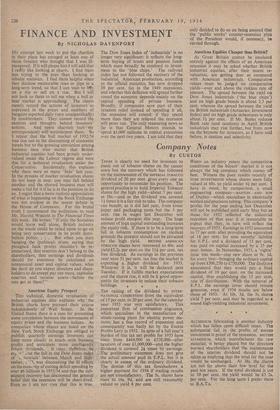FINANCE AND INVESTMENT
By NICHOLAS DAVENPORT actions. And some chartists (not my correspondent) will misinterpret them. So I repeat that the bull market of 1952/54 was due not to the discounting of economic trends but to the growing conviction among business men who matter that British industrial equities had been grossly under- valued under the Labour regime and were due for a technical revaluation under the Conservative. Incidentally, this explains why there were so many bids' last year. In the process of market revaluation shares do not keep in step: one may fall behind another and the shrewd business man will make a bid for it if he is in the position to do so. 1 regret that a more realistic appreciation of what is happening on the Stock Exchange was not evident in the recent debate in the House of Commons. For the brutal truth 1 recommend the politicians to read Mr. Harold Wineott in The Financial Times this week. He writes: "If only the Socialists would leave well alone, British industry on the whole could be relied upon to go on being very conservative in its profit distri- bution policy. . . . But when you start banging the (political) dfum, saying that ploughed back profits shouldn't be re- munerated, that reserves don't belong to the shareholders, that earnings and dividends should for evermore be calculated on nonsensical asset and capital values, what the devil do you expect directors and share- holders to do except pay out more, capitalise reserves and revalue assets—before the rats get at them?"
American Equity Prospect This technical, domestic revaluation of industrial equities also explains why the British charts have pursued their course independently of Wall Street. In the United States there is a case for presuming some correlation between the movements of equity prices and the business indices. As companies whose shares are listed on the New York Stock Exchange are obliged to publish quarterly earnings investors can keep more closely in touch with business profits and anticipate more intelligently future dividends. It may, thefefore, be tut ' ,:lat the fall in the Dow Jones index of '1. tustrials' between March and Sept- ember, .1-1, was discounting the ill effects on the economy of cutting deficit spending by over $6 billions in 1953/54 and that the sub- sequent recovery has discounted the general belief that the recession will be short-lived. Even so I am not sure that this is true. The Dow Jones index of 'industrials' is no longer very significant: it reflects the long- term buying of trusts and pension funds which must broadly be confined to invest- ment in the 'blue chips.' The railroad index has not followed the recovery of the industrial. American production, according to the official statistics, has now dropped 10 per cent. (as in the 1949 recession), and whether this'deflation will spread further round the economy depends mainly on the capital spending of private business. Broadly, if companies save part of their taxation relief instead of spending it all, the recession will extend: if they spend more than they are relieved the recession will peter out. The only reassuring news so far is that General Motors intends to spend $1,000 millions in capital extensions over the next two years. I am told that they only decided to do so on being assured that the 'public works' counter-recession plan of the President would, if necessary, be carried through.
American Equities Cheaper than British?
As Great Britain cannot be insulated entirely against the effects of an American recession it may be asked whether British industrial equities, after their recent re- valuation, are getting dear as compared with American industrials. Comparative values must be judged on comparative yields—over and above the riskless rate of interest. The spread between the yield on Dow Jones industrials (' the blue chips') and on high grade bonds is about 2.5 per cent. whereas the spread between the yield on British industrials (Actuaries Investment Index) and on high grade debentures is only about 11 per cent. If Mr. Butler reduces Bank rate (and taxation) in April British industrials may rise further, but from now on the keynote for investors, as I have said before, is caution and selectivity.


































 Previous page
Previous page